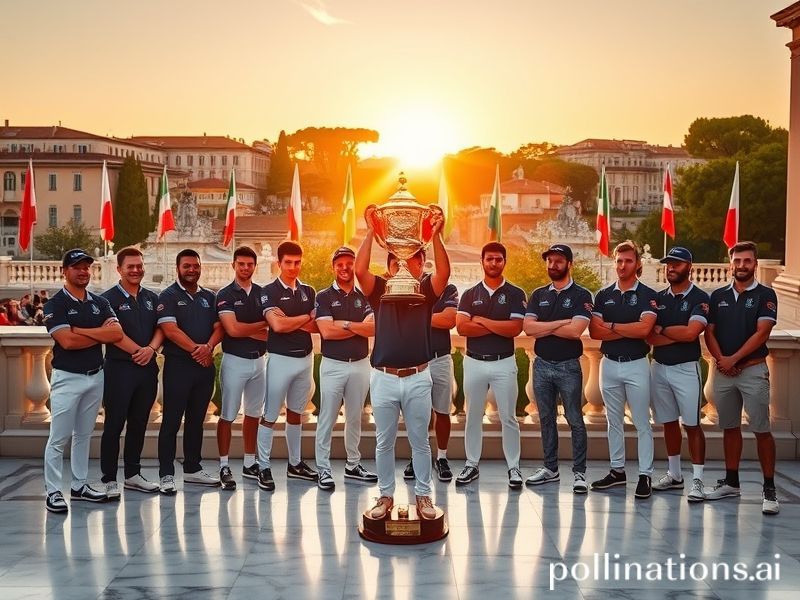Europe’s Ryder Cup Team: The Only Union Still Working (Until the Next Recession)
Europe’s Ryder Cup Team: The Last Remaining Coalition That Still Works—For Now
Marco Simone, Rome – While the United Nations Security Council bickers over whose war crimes are more symmetrical, and the eurozone spends its evenings Googling “creative accounting synonyms,” twelve men in pastel cashmere have quietly assembled the only functioning European alliance left standing. The 2023 European Ryder Cup team—officially “Team Europe,” because “Team Schengen Plus Golfers” didn’t test well with focus groups—just reminded the planet that cooperation is still possible, provided the stakes are low enough and the dress code is pastel-adjacent.
For the uninitiated, the Ryder Cup is that biennial ritual where Europe pretends it’s a single country and America pretends golf is a contact sport. This year the spectacle unfolded on Rome’s outskirts, a city that has seen empires rise, fall, and rebrand as influencer agencies. The Eternal City therefore provided the perfect backdrop for a continent trying to look eternal while its bond markets wobble like a three-putt on day three.
Global audiences tuned in from time zones where “subprime” is still a breakfast cereal and “green transition” refers to the color of the local river. They witnessed a squad drawn from Denmark to Spain, via Northern Ireland and points in between, coalescing around a simple principle: if we don’t hang together, we’ll be individually humiliated on American cable television. Unity through mutually assured embarrassment—truly the most European idea since the butter mountain.
The composition of the team reads like a Schengen visa application in athletic form. There’s the Spanish world-number-one whose swing looks suspiciously like it was engineered in Stuttgart, the Dane who putts as if he’s billing by the hour, and the Englishman whose post-round interviews are a masterclass in apologizing for empire. Together they form a living exhibit titled “Whatever Happened to the Nation-State?” The answer, apparently, is that it moved to Florida for tax reasons.
Meanwhile, across the Atlantic, the U.S. side arrived armed with analytics, private jets, and nine different coaching apps that all contradict one another. America’s strategy seemed to be: drown the course in red, white, and blue until it files for bankruptcy protection. It didn’t work. Europe won 16½–11½, a margin economists immediately tried to convert into a fiscal-stability pact.
What does it all mean for the wider world? For one, it proves that Europeans can still agree on something—namely that watching an American miss a two-footer is a universal language. More importantly, the victory gives Brussels a rare PR win that isn’t immediately followed by a Hungarian veto. EU Commission President von der Leyen was seen high-fiving Rory McIlroy, probably the first time a European leader has celebrated anything without a simultaneous press release on agricultural subsidies.
Diplomats from Beijing to Brasília took note. If twelve guys with conflicting dietary requirements can synchronize their swings, perhaps trade negotiations need only add a four-ball format. The G-20 is reportedly studying whether summit deadlocks could be resolved by sudden-death playoffs, though climate summits would still require extra holes—preferably before the Maldives become one.
Of course, the euphoria will last exactly until the next ECB meeting, at which point the continent will remember that you can’t chip your way out of a sovereign-debt crisis. Still, for one crisp autumn week, Europe exported something other than inflation: hope, lightly scented with eucalyptus and irony.
In the end, the Ryder Cup is a reminder that all empires eventually become hobbies. The Romans left us aqueducts; the British left us parliamentary procedure; Team Europe 2023 has left us a commemorative hat and the fleeting illusion that unity is par for the course. By next quarter the hat will be in a landfill and the illusion will be back on life support, but for now the continent is basking in the warm glow of collective competence. Cherish it—history suggests the sequel will be a shank into the water hazard of geopolitics.







